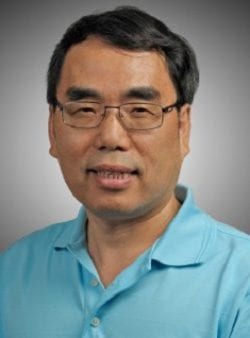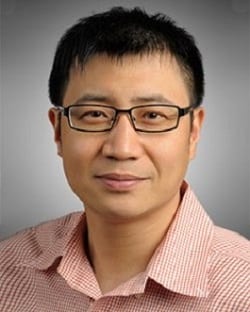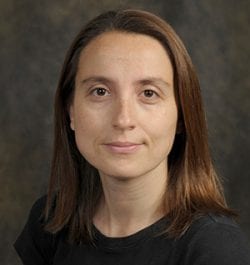Rising Stars
The COS Dean’s Distinguished Researcher and Rising Star Awards recognize the efforts of the most ‘research productive’ faculty and the outstanding value that they bring to their classroom teaching, as well as to the unambiguous value of the research mentorship that they offer to undergraduate and graduate students that are their apprentices.
The applicants must have an outstanding research, scholarly, and/or creative record that advances the body of knowledge in their field.
The College of Sciences would like to congratulate following 2017 recipients:
Dean’s Distinguished Researcher Award: Zenghu Chang, Ph.D., Department of Physics
Dr. Chang’s research focuses on one of the frontiers of physics: the generation, characterization, and application of isolated attosecond pulses. His team uncovered a new regime of below-threshold harmonics generation in the vacuum ultraviolet. His work was published in Nature Photonics in 2014 and selected for a SPIE Newsroom report. Dr. Chang has published over 170 papers in the field of ultrafast high power lasers, ultrafast XUV/X-ray science, and strong field atomic, molecular and optical physics.
His notable contributions include inventing the Double Optical Gating for the generation of single isolated attosecond pulses. His group generated the shortest laser pulse, 67 attoseconds, which is the current world record. He is the author of the book Fundamentals of Attosecond Optics. His work has been cited over 9,000 times (~2,600 in the last three years), leading to an H-index of 49.
He has been highly successful in garnering research funding, with over $10M in the last three years including as PI of a DOD Multi-University Research Initiative grant. He is a Fellow of the American Physical Society and of the Optical Society of America.
Dean’s Assistant Professor Rising Star Award: Yu Yuan, Ph.D., Department of Chemistry
Dr. Yuan seeks to identify and develop naturally occurring small molecules as potential cancer chemotherapeutic agents and as antibiotics. Candidate molecules should have good potency to kill cancer cells or bacteria and be chemically accessible for extensive modifications in order to achieve favorable drug properties.
For example, Dr. Yuan’s team has set up a drug discovery platform based on a novel peptide teixobactin. This molecule has a unique bacterial inhibition pathway, and the optimization efforts have identified several lead molecules to treat methicillin-resistant S. aureus (MRSA) and tuberculosis.
He has been funded by the National Institute of Health and the Gates Foundation. His work is published in high impact journals including Nature Communications and has had a notable effect on other researchers. For example, a recent review article described his effort as having turned around the remaining hurdle to the total synthesis of teixobactin.
Dean’s Associate Professor Rising Star Award: Basak Gurel, Ph.D., Department of Mathematics
Dr. Gurel’s research lies at the interface between symplectic and contact geometry and Hamiltonian dynamical systems, with a particular focus on the question of the existence of periodic orbits. The study of periodic orbits (i.e., cyclic motions) is connected to many areas of mathematics (e.g., Riemannian geometry, applied mathematics, number theory) and other sciences (e.g., physics and astronomy, chemistry, biology).
Her recent work has focused on the question of the existence of infinitely many periodic orbits (the Conley conjecture). One major difficulty here is that there is no intuitive reason to expect the conjecture to hold or fail, and no method readily applicable to attack the question. Dr. Gurel has sought to investigate this problem from every angle: geometrical, dynamical and topological approaches, proving existence results of a general nature and also concerning particular systems such as the motion of a charge in a magnetic field, and constructing non-trivial examples of Hamiltonian systems without periodic orbits.
Her work has been published in top-tier journals and she has been invited to speak at international conferences and institutions including Stanford and the Institute for Advanced Study at Princeton. She has also received an NSF CAREER Award. A recent publication, “Lusternik-Schnirelmann theory and closed Reeb orbits,” was awarded the Académie Royale de Belgique prize, Concours Annuel, Classe des Sciences, in December, 2016.



